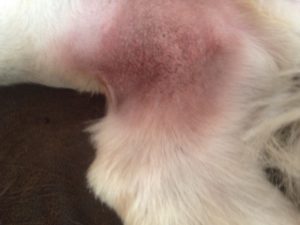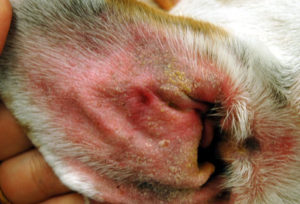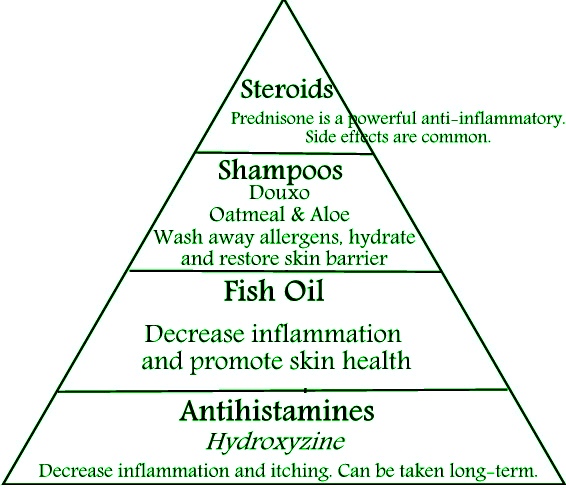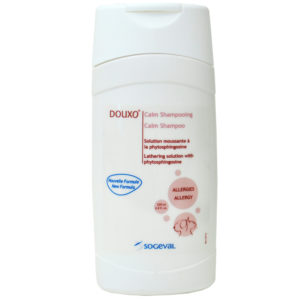
Most dogs and cats show allergies through intensely itchy skin, often on their paws, on the belly, and where the legs meet the body. Most ear infections are secondary to allergies and many pets display their allergies primarily through their ears. Excessive scratching can lead to extremely irritated, broken, and infected skin. Pets often scratch or lick affected areas. Enzymes in saliva can stain the hair, causing a reddish discoloration after excessive licking. Chronic skin irritation can lead to skin changes such as thickening, hardening, or increased pigmentation.
It is important that bacterial and fungal skin infections, skin mites, and other possible causes of skin irritation be ruled out by thorough examination by your veterinarian.
Moderate skin allergies in a dog

Why is my dog so itchy?
Histamine release is triggered by allergens. Allergens can be inhaled, such as pollens, or come directly into contact with skin. Food allergies are very rare.
Many pets have allergy flares during the Spring and Fall – when plants start blooming and as they get their last blooms out as winter sets in.
The most common allergies in this area of southern New Mexico are to juniper, tumbleweed, Bermuda grass, and mesquite.

Ear irritation secondary to allergies
Benadryl doesn’t help.
Benadryl is helpful for some allergies, but does not affect the skin as well as prescription antihistamines, such as Hydroxyzine.
Should my pet eat a “grain-free” diet?
The “grain-free” pet food movement has become primarily a marketing ploy by pet food companies. In reality, food allergies are very rare and when they are present, are often caused by a meat product. The best way to identify a food allergy is through a strict 8-week novel diet trial.
My last vet gave my pet a shot.

Steroids have their place in the treatment of allergies, however, they should never be used alone. Steroids should be used only in severe cases and along with antihistamines, fish oils, and specialized shampoos.
Steroids have many side effects, ranging from minor annoyances like increased drinking and urination to serious complications such as gastrointestinal damage, kidney and liver damage, and hormone disturbances.
Can my pet be tested for allergies?
There are blood tests for allergies, although they are expensive and often bring up some false-positive results. Many owners feel that their pet is “allergic to everything” after having testing done. Testing does, however, have a place in treatment, often when standard therapies have failed to provide relief.
The Skin Allergy Pyramid: How to safely and effectively treat skin allergies

The main treatments for soothing skin allergies are:
1) Identifying and reducing exposure to allergy triggers
2) Antihistamines for skin relief
-Antihistamines decrease itchiness and therefore scratching and skin irritation
-The most effective for skin is prescription Hydroxyzine
3) Fish oil for decreasing inflammation and restoring skin’s natural protective barriers
4) Topical relief such as medicated shampoos and soothing lotions wash away allergens and can also help restore skin’s protective barriers
5) The judicious use of steroids at the lowest effective dose
6) Very severe cases may require immune-suppressing medications
7) Secondary infection requires antibiotic therapy

Skin allergies can be frustrating for pets and their owners, but they can be managed.
If you have more questions or concerns about your pet’s allergies, please do not hesitate to call. Let our Advanced team make your pet more comfortable!

575-388-1503
Deuce, pictured with Dr. Shelby Bradberry, has chronic skin allergies, which are managed well with the therapies mentioned in this article.





